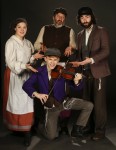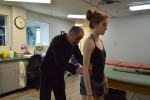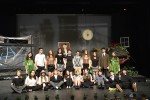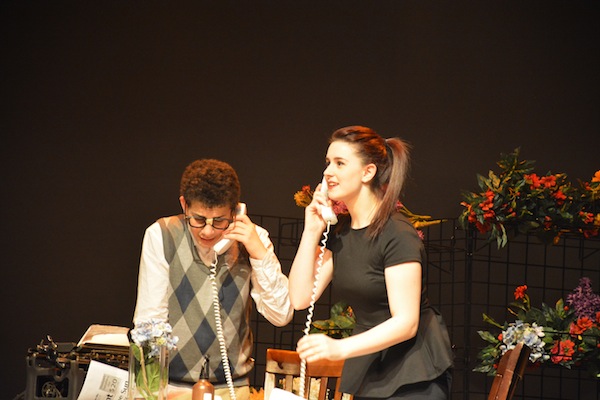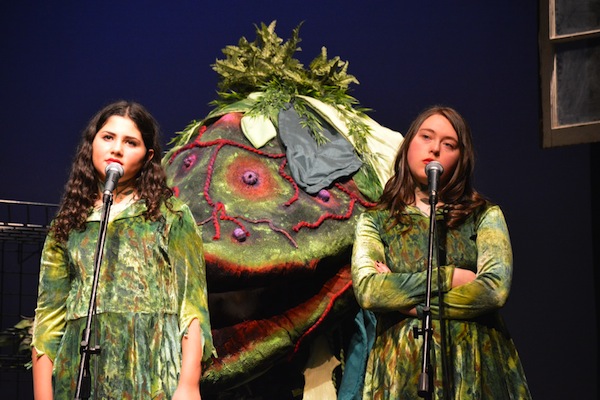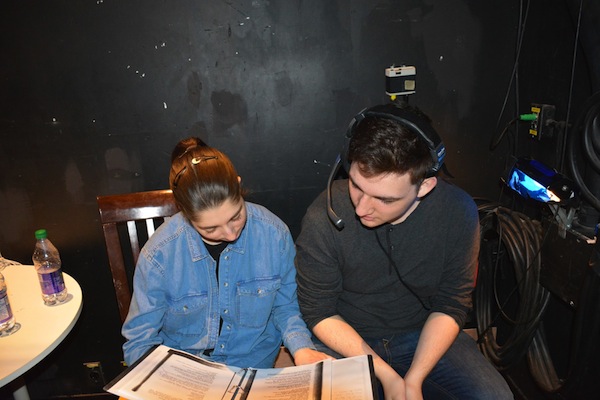Jewish community members in Royal City Musical Theatre’s production of Fiddler on the Roof, left to right: Erin Palm, Warren Kimmel and Zach Wolfman, with Michael Wilkinson in front. The show runs April 7-23 at Massey Theatre. (photo by Tim Matheson)
This year’s Royal City Musical Theatre production is Fiddler on the Roof. Playing the legendary lead character of Tevye the Milkman is Jewish community member Warren Kimmel.
Addressing the community, Kimmel acknowledged that Fiddler is “one of those pieces of art that have just become part of the culture almost by osmosis.” But, he added, “Fiddler on the Roof is an intensely Jewish musical and, although musical theatre is hugely populated by Jewish composers and performers, Fiddler is perhaps the only mainstream musical that deals directly with the Jewish experience. So, although your children might know ‘If I Were a Rich Man’ by cultural absorption, I would urge you to bring them all to see this piece. It’s a fundamental part of who we are and I think it’s going to be a great production.”
Directing and choreographing the RCMT show is Valerie Easton and the musical director is James Bryson, who will lead a full orchestra. Kimmel will be joined by three other Jewish community members on stage: Michael Wilkinson (Fiddler), Zack Wolfman (Perchik) and Erin Palm (Fruma Sarah). They and the rest of the cast have a challenge in making their iconic characters their own.
“I have made the character my own by growing a real beard!” said Kimmel, noting that it took three months to grow and has changed his life. “Seriously though, the fact that the role is iconic has been a real issue for me because I actually grew up watching that movie and I think that it is not for no reason that Topol is world-famous from only one identifiable role. I think it’s a brilliant movie and a landmark performance, so it has been quite difficult not to copy what he’s doing. At the same time, I think what would be worse would be to try and do something different just for the sake of being different. So, what I’ve tried to do, and I guess what I always try to do, is find the truth of the story for that character and play that. But they are big boots to fill, no doubt, and an even bigger beard!”
“It’s definitely hard when there is a fixed idea of how a character should be,” Wolfman said. “I am steering clear of the trap by approaching the role like I would any other. I look at the words on the page and the circumstances the character finds himself in. The show is iconic because the characters and story are well written, and it makes our jobs easier as actors because that information is all on the page for us to use…. When I say the same words in the same order, it is the character, and I suppose it will become my own when it comes out of my mouth!”
For her part, Palm said she loves “when an actor really takes risks and brings new life to the characters they play. I think I make Fruma Sarah my own by really trying to understand what she wants, in the most honest way possible.”
Fiddler on the Roof was one of the first musicals Palm ever saw. “It made a huge impact on me,” she said. So, for her, part of the fun of being in this production “comes out of years of being excited about the opportunity to do the show and then getting a chance to do it. I love the music and the story.”
Part of the challenge is to convey the time and place of the action. Based on Tevye and his Daughters and other stories by Sholem Aleichem, Fiddler is set in 1905 in Anatevka, a fictional Russian village. It centres around Tevye and his efforts to maintain Jewish traditions while trying to keep his wife and five daughters happy and safe.
“Being that we don’t live in Anatevka and it is 2016,” said Palm, “it’s relating to those social and economic differences and times that makes it a challenge … capturing the old world feeling in a way that is truthful and heartwarming, that’s what sweeps you away to Anatevka, that’s the charm of the show.”
For Wolfman, “Having the opportunity to play a character that is playing against the traditional values of the characters in the play is fun. Perchik has more modern sensibilities and, in a way, he acts as a proxy for the audience to see the differences in beliefs on stage. It is fun to play a character with a strong point of view who is willing to fight for what he believes in…. The challenge for me has been finding the balance between the Perchik who is warm and loving, and the hard-nosed revolutionary. Of course, both sides exist within the character, so it’s interesting to grapple with what comes out at what times. It’s an ongoing question for me so, as my old acting professor Stephen Heatley would say, I’m ‘keeping the questions open and active.’”
In a somewhat similar vein – trying to find balance within a character – Wilkinson said, “It’s been very fun and exciting for me to find the way the Fiddler fits in as a metaphor in Tevye’s mind but also has a personality and character of his own.”
Not only does Wilkinson have to figure that out, but he is also playing a Russian dancer in the song “To Life.” He said that Easton “has given us wonderful choreography and the Russian dancing is particularly fun, but also challenging – especially since most of us don’t have training in Russian dance!”
Kimmel described Easton as “one of the real jewels of this city’s theatre community and we have worked together enough times now that I know I can allow her to guide me in my performance and that, if I trust her, she will make it a better one. That’s meant to be the director’s job, I guess, and it’s what you always hope for as an actor, but it doesn’t happen nearly as often as you would hope.”
Last year, Kimmel worked with both Easton and Bryson on RCMT’s My Fair Lady. “Both brilliant,” he said. “Also, there are a few cast members from My Fair Lady that have reappeared in Yiddish garb and large beards and it’s always great to be on stage with people you know and trust. However, all the people I have close relationships with in the piece – my wife and five daughters – are all performers I’ve never worked with before and that’s quite exciting.”
It is also Wilkinson’s second production with Easton, Bryson and RCMT. He was in the ensemble of Annie in 2014. “The Vancouver theatre community isn’t huge, so usually there are some familiar faces when a new production starts rehearsals. I’ve met a bunch of new wonderful people in this production, as well as a few with whom I’ve worked before.”
Wolfman was at the University of British Columbia with a couple of the other leads, including Jenika Schofield, and has acted before with several members of the cast. “In fact,” he noted, “Jenika actually played my love interest in Titus: The Light and Delightful Musical Comedy and now she’s playing Hodel, who falls in love with Perchik. Crazy, right?!”
While this is his first time working with Easton and Bryson, Wolfman said, “Patrick Ray, our piano player, accompanied a show I did in the past, and maybe saved my life musically more than once.”
Palm worked with Easton right after graduating from Capilano University. It was in an Arts Club on Tour production of the musical The Thing About Men, where, she said, “I played 13 different characters, that was a highlight of my career. I just love her as a director. She’s just so present and physical in her directing skills. She’s very giving, she’s very much an actor’s director…. Also, I am a big fan of female directors. There are so few of them and so, when you get an opportunity to work with a director with such a clear vision who is a woman, I celebrate that.”
Palm also knows some of Fiddler’s cast from previous acting work, she took voice lessons for awhile with Sylvia Zaradic (Yente) and did a video with Natasha Zacher (Tzeitel) and others called Finding Face Time: A YouTube Musical!, which is online.
In the casting process, Palm was called back for two different roles: Tzeitel and Fruma. She said she is grateful to have been chosen “as part of the vision of the show and cast as Fruma Sarah.”
“I think the casting is very well put together and I couldn’t imagine the show being cast any other way,” she said. “We really have worked together as a collective, the chorus is really strong. There are a lot of talented actors and singers in this show, lots of young and up-and-coming talent, too, who really bring something special, new and exciting to the roles they play.”
Initially, Wolfman wasn’t sure for which role he would audition. During Oliver! at Theatre Under the Stars last summer, he said, “[M]any of the cast members in the show were buzzing about Fiddler on the Roof auditions during the run. A fellow cast mate, Kat Palmer, said I should go out for Perchik if I got a chance, so the show fell on my radar. When I first auditioned, I was thinking about Motel and Fyedka as possible roles, but after re-reading the script, I definitely had my heart set on Perchik and that’s what happened!”
When Wilkinson auditioned, he said, “I had to sing a song in front of the directing team and take part in the group dance call. I didn’t go in with a specific role in mind and was just hoping to be a part of the show in some capacity. It worked out well and I’m having a great time being a part of the production.”
As for the patriarch of the show, Kimmel said, “I originally auditioned for the role of Yente the Matchmaker but I lost that role, unfortunately, and had to settle for Tevye. No, in reality, I think Tevye has always been one of the roles that I felt I would have to do at some point or other, being Jewish for a start, and just loving this play since I was a child. So, I asked Val if I could audition. Honestly, I thought I was a bit young for the role and I still feel I struggle with the [emotional] weight of Tevye…. Also, there are a few performers in town that have been very successful playing the role and I was pretty sure they would be offered it, but it seems my audition – together with a large cheque made out to Val – clinched it for me.”
RCMT’s Fiddler on the Roof takes place at Massey Theatre, 735 Eighth Ave., in New Westminster, Wednesday-Sunday, April 7-23. Ticket are $47 ($38 seniors/students, $29 children 13 and under) from ticketsnw.ca and 604-521-5050.




